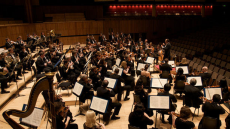
The orchestration of Opera is another aspect that has delightfully transcended into today’s film culture. Opera has always relied upon the rich timbral quality of an orchestra, and also the juxtaposition of that to create dramatic effect and pathos. This is in stark contrast to the notion that films may not even require music at all, or the early idea that randomly selected generic themes were sufficient for the needs of a film. Now, the music of a film is often as iconic as the film itself; a film can be instantly recognised by its theme, and the music can bring even the toughest of audiences to tears in the middle of an epic action film such as ‘the Lord of the Rings.’ The film industry has more than embraced the Opera culture of the orchestra, with composers such as Hans Zimmer using more than two hundred different drum recordings to create the desired sounds for his film scores. The music extends far beyond the realms of reality; the audience does not simply want the sounds of horses’ hooves clopping on the ground with the entrance of a cavalry, they want to feel the raw emotions of the characters they are watching, seep through into the accompanying music. Equally, Opera was never realistic in this sense; people do not express every sentence in the form of song, and nor are they backed by orchestras. However, the undisputable charm of this style of narration first seen in opera, has filtered into another genre of film alone; the musical.
The musical is perhaps the most obvious of all the contributions of opera to film; it is only really the genre of music and the added dialogue that is any different to the original operas. As such, I believe that Opera has greatly impacted upon the modern day film industry. The musical is the opera in a contemporary setting, and is accessible to all, as opera grew to be in its heyday. Once again, audiences are encapsulated within an alternate reality wherein music coexists with everyday life, and we take it as a given, not questioning the orchestra we are hearing despite there not being a sign of it on screen (the use of non-diagetic sound).
In a time when we actively listen to film soundtracks on our personal music players, independently of watching the film, I think it is clear that Opera has developed the film industry more than ever could have been foreseen. It is a wonderful legacy to see the techniques of such musical masterpieces, such as the use of leitmotifs, being incorporated into media that will be seen by most of the Western world. I think all of this, is reason enough to dismiss the theory that films do not require music; it is the music that makes the films, much as the music makes the opera. It may be uncredited as such, but the great film scores of today, are they not masterpieces in themselves, such as the original operas? Are films not operas, simply removed from a live setting?
Image1: http://www.timeout.com/london/music/classical-music

0 Comment:
Be the first one to comment on this article.